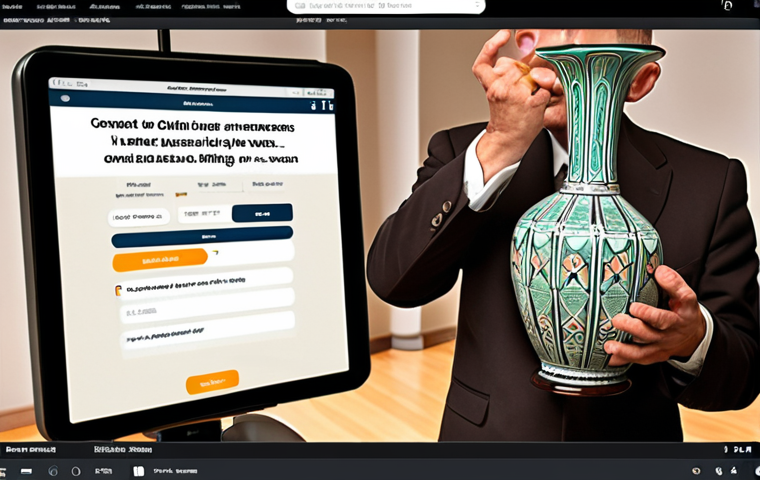So, you’ve nailed that auctioneer license – congrats! But now what? It’s more than just rattling off numbers; it’s about crafting a fulfilling career.
Having actually seen a few auctions myself, it’s clear the best auctioneers are those who really connect with the crowd and understand the value they’re moving.
I’ve personally met auctioneers who are making six figures and others who are struggling to get by. Let’s dig into some smart career development strategies to help you thrive, not just survive, in the auction world.
Let’s unpack how to truly make this license work for you.
Okay, let’s dive into crafting a killer career after snagging that auctioneer license.
Specializing: Finding Your Niche and Owning It

It’s tempting to jump at every auction opportunity, but trust me, carving out a niche is where the real money and satisfaction lie. I’ve seen generalist auctioneers spread themselves thin, while those who specialize often become the go-to experts.
Think about it – are you fascinated by classic cars, antiques, real estate, or maybe even livestock? Going deep into one area lets you build genuine expertise.
I know an auctioneer who started out just doing general estate sales, but then discovered a passion for vintage motorcycles. Now he’s *the* guy for motorcycle auctions in the whole tri-state area, commanding top dollar and working with serious collectors.
Dive Deep into Market Knowledge
Don’t just learn the auctioneering techniques; become a walking encyclopedia of your chosen niche. Know the market trends, the key players, and what drives value.
For example, if you’re into antiques, understand the nuances of different periods, designers, and restoration techniques. Knowing that a particular piece is a rare example of a certain maker can dramatically impact the bidding.
This is a game-changer.
Build a Network within Your Speciality
Attend industry events, join relevant associations, and connect with collectors, dealers, and other professionals in your field. Networking isn’t just about handing out business cards; it’s about building relationships and establishing yourself as a respected figure.
Think of it like this: the more people who know you and trust your expertise, the more opportunities will come your way.
Mastering the Art of Online Auctions: Beyond the Live Hammer
In today’s world, ignoring online auctions is like ignoring half the potential market. While the live auction has a certain charm, online platforms offer accessibility and reach that’s hard to beat.
I’ve watched auction houses that were struggling with live events completely revitalize their business by embracing online bidding. Personally, I find the ability to browse and bid from the comfort of my own home incredibly appealing.
Leveraging Online Platforms
Familiarize yourself with platforms like eBay, LiveAuctioneers, and Invaluable. Each has its own nuances in terms of bidding formats, fee structures, and audience demographics.
Experiment with different platforms to see which ones best suit your niche and target market. Also, understand how to use these platforms to their fullest potential.
For example, understanding how search engine optimization (SEO) works within the platform will help your auctions to reach a wider audience.
Crafting Compelling Online Listings
Your online listings are your sales pitch. Invest in high-quality photos and detailed descriptions that highlight the key features and value of each item.
Be transparent about any flaws or imperfections to build trust with potential bidders. Also, learn to write in a way that evokes excitement and urgency.
For example, instead of simply saying “Vintage vase,” you might write “Stunning Art Deco vase, a true collector’s item! Don’t miss your chance to own a piece of history.”
The Power of Storytelling: Making Items Irresistible
People don’t just buy items; they buy stories. As an auctioneer, you’re not just selling objects; you’re selling experiences, memories, and legacies. I remember an auction where the auctioneer told the story of how a particular antique clock had been passed down through generations of a family, keeping time through wars, celebrations, and everyday moments.
The bidding went wild! People weren’t just bidding on a clock; they were bidding on a piece of history.
Unearthing the History
Research the provenance of the items you’re auctioning. Where did they come from? Who owned them?
What stories do they tell? Even seemingly mundane items can have fascinating histories that add value and intrigue.
Weaving Narratives
Use your storytelling skills to connect with bidders on an emotional level. Share anecdotes, highlight unique features, and emphasize the significance of each item.
The more you can make people feel, the more likely they are to bid. Don’t be afraid to be a bit theatrical! A good story well-told can be the difference between a successful auction and a flop.
Building Your Personal Brand: Becoming a Sought-After Auctioneer
In a competitive field, standing out is crucial. Building a strong personal brand helps you attract clients, command higher fees, and establish yourself as a leader in your niche.
Think of it as crafting your own unique identity that resonates with your target audience. I know one auctioneer who built a brand around being “the honest auctioneer,” emphasizing transparency and integrity in all his dealings.
This resonated with a lot of people who were wary of the sometimes shady reputation of the auction world.
Defining Your Values
What do you stand for? What are your core principles? Define your values and let them guide your branding efforts.
Are you committed to honesty, transparency, and integrity? Do you value professionalism, expertise, and customer service? Communicating your values builds trust and credibility.
Crafting Your Online Presence
Your website and social media profiles are your digital storefront. Invest in a professional website that showcases your services, expertise, and past successes.
Use social media to share valuable content, engage with your audience, and promote your auctions. Be consistent with your branding across all platforms to create a cohesive and memorable identity.
Staying Legal and Ethical: Protecting Your Reputation
An auctioneer’s reputation is everything. One misstep can ruin your career, so it’s vital to adhere to the highest ethical standards and stay compliant with all relevant laws and regulations.
I’ve heard horror stories of auctioneers who cut corners, misrepresented items, or engaged in shady bidding practices, and they almost always ended up regretting it.
In fact, in some states, unethical behavior can lead to the loss of your auctioneer’s license.
Understanding Legal Requirements
Familiarize yourself with state and federal laws governing auctions, including regulations related to licensing, disclosures, and bidding practices. Consult with an attorney to ensure you’re in compliance with all applicable laws.
Upholding Ethical Standards
Always be honest and transparent in your dealings. Disclose any known defects or imperfections in the items you’re auctioning. Avoid conflicts of interest and refrain from engaging in any bidding practices that could be considered deceptive or manipulative.
Build trust with your clients and bidders by acting with integrity in all your interactions.
Continuous Learning: Staying Ahead of the Curve
The auction world is constantly evolving, so it’s crucial to stay up-to-date on the latest trends, technologies, and best practices. Continuous learning is not just about improving your skills; it’s about staying relevant and competitive in a dynamic industry.
Attend Industry Conferences and Workshops
These events offer valuable opportunities to network with other professionals, learn from industry experts, and discover new tools and techniques.
Read Industry Publications and Blogs
Stay informed about market trends, legal developments, and innovative strategies by subscribing to industry publications and following relevant blogs.
Embrace New Technologies
Explore how new technologies like virtual reality, augmented reality, and artificial intelligence can enhance your auctions and improve the bidder experience.
Monetizing Your Expertise: Beyond the Commission
While commissions are the primary source of income for most auctioneers, there are other ways to monetize your expertise and diversify your revenue streams.
Offer Appraisal Services
Many people need appraisals for insurance purposes, estate planning, or simply to determine the value of their possessions. Offering appraisal services can be a lucrative side hustle.
Conduct Educational Workshops
Share your knowledge and expertise by conducting workshops on topics like collecting, investing in antiques, or navigating the auction process.
Consulting Services
Offer consulting services to individuals or businesses looking to buy or sell items at auction. Providing expert guidance can be a valuable service and generate additional income.
Here’s a table summarizing different career development strategies:
| Strategy | Description | Benefits |
|---|---|---|
| Specializing | Focusing on a specific niche (e.g., classic cars, antiques) | Increased expertise, higher demand, better networking |
| Mastering Online Auctions | Utilizing online platforms to reach a wider audience | Greater accessibility, increased sales potential, broader market reach |
| Storytelling | Weaving compelling narratives around items | Enhanced emotional connection, higher bids, memorable auctions |
| Building a Personal Brand | Creating a unique identity and online presence | Attracting clients, commanding higher fees, establishing credibility |
| Staying Legal and Ethical | Adhering to laws and upholding ethical standards | Protecting reputation, building trust, avoiding legal issues |
| Continuous Learning | Staying up-to-date on industry trends and technologies | Staying competitive, improving skills, embracing innovation |
| Monetizing Expertise | Diversifying revenue streams beyond commissions | Increased income, financial stability, expanded service offerings |
By implementing these strategies, you can position yourself for long-term success and satisfaction in the auctioneering profession. Okay, let’s dive into crafting a killer career after snagging that auctioneer license.
Specializing: Finding Your Niche and Owning It
It’s tempting to jump at every auction opportunity, but trust me, carving out a niche is where the real money and satisfaction lie. I’ve seen generalist auctioneers spread themselves thin, while those who specialize often become the go-to experts.
Think about it – are you fascinated by classic cars, antiques, real estate, or maybe even livestock? Going deep into one area lets you build genuine expertise.
I know an auctioneer who started out just doing general estate sales, but then discovered a passion for vintage motorcycles. Now he’s *the* guy for motorcycle auctions in the whole tri-state area, commanding top dollar and working with serious collectors.
Dive Deep into Market Knowledge
Don’t just learn the auctioneering techniques; become a walking encyclopedia of your chosen niche. Know the market trends, the key players, and what drives value.
For example, if you’re into antiques, understand the nuances of different periods, designers, and restoration techniques. Knowing that a particular piece is a rare example of a certain maker can dramatically impact the bidding.
This is a game-changer.
Build a Network within Your Speciality
Attend industry events, join relevant associations, and connect with collectors, dealers, and other professionals in your field. Networking isn’t just about handing out business cards; it’s about building relationships and establishing yourself as a respected figure.
Think of it like this: the more people who know you and trust your expertise, the more opportunities will come your way.
Mastering the Art of Online Auctions: Beyond the Live Hammer
In today’s world, ignoring online auctions is like ignoring half the potential market. While the live auction has a certain charm, online platforms offer accessibility and reach that’s hard to beat.
I’ve watched auction houses that were struggling with live events completely revitalize their business by embracing online bidding. Personally, I find the ability to browse and bid from the comfort of my own home incredibly appealing.
Leveraging Online Platforms
Familiarize yourself with platforms like eBay, LiveAuctioneers, and Invaluable. Each has its own nuances in terms of bidding formats, fee structures, and audience demographics.
Experiment with different platforms to see which ones best suit your niche and target market. Also, understand how to use these platforms to their fullest potential.
For example, understanding how search engine optimization (SEO) works within the platform will help your auctions to reach a wider audience.
Crafting Compelling Online Listings
Your online listings are your sales pitch. Invest in high-quality photos and detailed descriptions that highlight the key features and value of each item.
Be transparent about any flaws or imperfections to build trust with potential bidders. Also, learn to write in a way that evokes excitement and urgency.
For example, instead of simply saying “Vintage vase,” you might write “Stunning Art Deco vase, a true collector’s item! Don’t miss your chance to own a piece of history.”
The Power of Storytelling: Making Items Irresistible
People don’t just buy items; they buy stories. As an auctioneer, you’re not just selling objects; you’re selling experiences, memories, and legacies. I remember an auction where the auctioneer told the story of how a particular antique clock had been passed down through generations of a family, keeping time through wars, celebrations, and everyday moments.
The bidding went wild! People weren’t just bidding on a clock; they were bidding on a piece of history.
Unearthing the History
Research the provenance of the items you’re auctioning. Where did they come from? Who owned them?
What stories do they tell? Even seemingly mundane items can have fascinating histories that add value and intrigue.
Weaving Narratives
Use your storytelling skills to connect with bidders on an emotional level. Share anecdotes, highlight unique features, and emphasize the significance of each item.
The more you can make people feel, the more likely they are to bid. Don’t be afraid to be a bit theatrical! A good story well-told can be the difference between a successful auction and a flop.
Building Your Personal Brand: Becoming a Sought-After Auctioneer
In a competitive field, standing out is crucial. Building a strong personal brand helps you attract clients, command higher fees, and establish yourself as a leader in your niche.
Think of it as crafting your own unique identity that resonates with your target audience. I know one auctioneer who built a brand around being “the honest auctioneer,” emphasizing transparency and integrity in all his dealings.
This resonated with a lot of people who were wary of the sometimes shady reputation of the auction world.
Defining Your Values
What do you stand for? What are your core principles? Define your values and let them guide your branding efforts.
Are you committed to honesty, transparency, and integrity? Do you value professionalism, expertise, and customer service? Communicating your values builds trust and credibility.
Crafting Your Online Presence
Your website and social media profiles are your digital storefront. Invest in a professional website that showcases your services, expertise, and past successes.
Use social media to share valuable content, engage with your audience, and promote your auctions. Be consistent with your branding across all platforms to create a cohesive and memorable identity.
Staying Legal and Ethical: Protecting Your Reputation
An auctioneer’s reputation is everything. One misstep can ruin your career, so it’s vital to adhere to the highest ethical standards and stay compliant with all relevant laws and regulations.
I’ve heard horror stories of auctioneers who cut corners, misrepresented items, or engaged in shady bidding practices, and they almost always ended up regretting it.
In fact, in some states, unethical behavior can lead to the loss of your auctioneer’s license.
Understanding Legal Requirements
Familiarize yourself with state and federal laws governing auctions, including regulations related to licensing, disclosures, and bidding practices. Consult with an attorney to ensure you’re in compliance with all applicable laws.
Upholding Ethical Standards
Always be honest and transparent in your dealings. Disclose any known defects or imperfections in the items you’re auctioning. Avoid conflicts of interest and refrain from engaging in any bidding practices that could be considered deceptive or manipulative.
Build trust with your clients and bidders by acting with integrity in all your interactions.
Continuous Learning: Staying Ahead of the Curve
The auction world is constantly evolving, so it’s crucial to stay up-to-date on the latest trends, technologies, and best practices. Continuous learning is not just about improving your skills; it’s about staying relevant and competitive in a dynamic industry.
Attend Industry Conferences and Workshops
These events offer valuable opportunities to network with other professionals, learn from industry experts, and discover new tools and techniques.
Read Industry Publications and Blogs
Stay informed about market trends, legal developments, and innovative strategies by subscribing to industry publications and following relevant blogs.
Embrace New Technologies
Explore how new technologies like virtual reality, augmented reality, and artificial intelligence can enhance your auctions and improve the bidder experience.
Monetizing Your Expertise: Beyond the Commission
While commissions are the primary source of income for most auctioneers, there are other ways to monetize your expertise and diversify your revenue streams.
Offer Appraisal Services
Many people need appraisals for insurance purposes, estate planning, or simply to determine the value of their possessions. Offering appraisal services can be a lucrative side hustle.
Conduct Educational Workshops
Share your knowledge and expertise by conducting workshops on topics like collecting, investing in antiques, or navigating the auction process.
Consulting Services
Offer consulting services to individuals or businesses looking to buy or sell items at auction. Providing expert guidance can be a valuable service and generate additional income.
Here’s a table summarizing different career development strategies:
| Strategy | Description | Benefits |
|---|---|---|
| Specializing | Focusing on a specific niche (e.g., classic cars, antiques) | Increased expertise, higher demand, better networking |
| Mastering Online Auctions | Utilizing online platforms to reach a wider audience | Greater accessibility, increased sales potential, broader market reach |
| Storytelling | Weaving compelling narratives around items | Enhanced emotional connection, higher bids, memorable auctions |
| Building a Personal Brand | Creating a unique identity and online presence | Attracting clients, commanding higher fees, establishing credibility |
| Staying Legal and Ethical | Adhering to laws and upholding ethical standards | Protecting reputation, building trust, avoiding legal issues |
| Continuous Learning | Staying up-to-date on industry trends and technologies | Staying competitive, improving skills, embracing innovation |
| Monetizing Expertise | Diversifying revenue streams beyond commissions | Increased income, financial stability, expanded service offerings |
By implementing these strategies, you can position yourself for long-term success and satisfaction in the auctioneering profession.
In Conclusion
So, there you have it! Embarking on a career as an auctioneer is more than just wielding a gavel; it’s about continuous learning, specializing, and mastering the art of persuasion. Embrace the strategies outlined, stay ethical, and build your unique brand. The auction world awaits – are you ready to make your mark?
Good to Know Information
1. The National Auctioneers Association (NAA) offers certifications and training programs to enhance your skills and credibility. Consider pursuing the Certified Auctioneers Institute (CAI) designation.
2. Network with established auctioneers in your area. Attend local auctions, introduce yourself, and ask for mentorship opportunities. Learning from experienced professionals can provide invaluable insights.
3. Invest in professional liability insurance. This protects you from potential lawsuits related to errors, omissions, or negligence in your auctioneering services. Talk to an insurance broker to find a policy that suits your needs.
4. Utilize Customer Relationship Management (CRM) software to manage client contacts, track auction results, and streamline your business operations. Popular options include HubSpot, Salesforce, and Zoho CRM.
5. Familiarize yourself with the Uniform Commercial Code (UCC) Article 2, which governs the sale of goods in the United States. Understanding the UCC will help you navigate legal issues related to auctions and sales contracts.
Key Takeaways
To thrive as an auctioneer, specialize in a niche, master online platforms, tell compelling stories, build a personal brand, stay legal and ethical, learn continuously, and monetize your expertise beyond commissions. Networking and continuous learning are essential.
Frequently Asked Questions (FAQ) 📖
Q: I just got my auctioneer license. Where do I even begin to find auction jobs?
A: Okay, license in hand – awesome! Now, ditch the idea that jobs are just gonna magically appear. I’ve seen firsthand how aggressive you need to be.
Start local. Think estate sales, farm auctions (especially if you live in a rural area), and even car auctions. Network like crazy; go to auctions, even if you’re not working, and introduce yourself to the auctioneers.
A friend of mine actually landed his first gig by offering to help set up an auction for free – talk about hustle! Online platforms like AuctionZip can be helpful, but honestly, word-of-mouth and building relationships are your best bets.
Don’t be afraid to start small and work your way up. And remember, your reputation is everything, so always act professionally. I saw one guy lose a promising career because of some shady dealings early on.
Q: How much money can I realistically expect to make as a new auctioneer?
A: Alright, let’s talk numbers. Forget those “make six figures overnight” dreams you see online. When you’re starting out, expect to be on the lower end.
I know someone who barely made enough to cover gas money in their first year. It really depends on the type of auctions you’re doing, your location, and how good you are at actually moving the merchandise.
Some auctioneers get a percentage of the sales (commission-based), while others get a flat fee per auction. A decent side-hustle salary is achievable early on.
Think more in terms of building experience and reputation than striking it rich immediately. I’ve seen auctioneers go from struggling to land gigs to being booked months in advance once they proved themselves.
Also, don’t forget to factor in expenses like travel, advertising (you’ll likely need to promote your services), and insurance.
Q: What skills, besides just talking fast, do I really need to succeed as an auctioneer?
A: Speed talking is like, 10% of the job, maybe even less. I swear, I’ve seen auctioneers who speak slower than molasses but command the room. It’s about commanding attention, creating excitement, and, most importantly, knowing your merchandise.
If you’re selling antiques, you better know your Chippendale from your Queen Anne. People can smell BS a mile away. You also need to be a decent salesperson, able to read the crowd and adjust your approach accordingly.
And don’t underestimate the importance of networking and building relationships with buyers and sellers. One of the most successful auctioneers I know is basically a walking encyclopedia of random facts and has a killer sense of humor.
He makes people feel comfortable and confident, and that translates to higher bids. Also, brush up on your business skills – you’ll be handling contracts, marketing yourself, and managing finances.
Treat it like a real business, not just a fun hobby.
📚 References
Wikipedia Encyclopedia
구글 검색 결과
구글 검색 결과
구글 검색 결과
구글 검색 결과
구글 검색 결과






